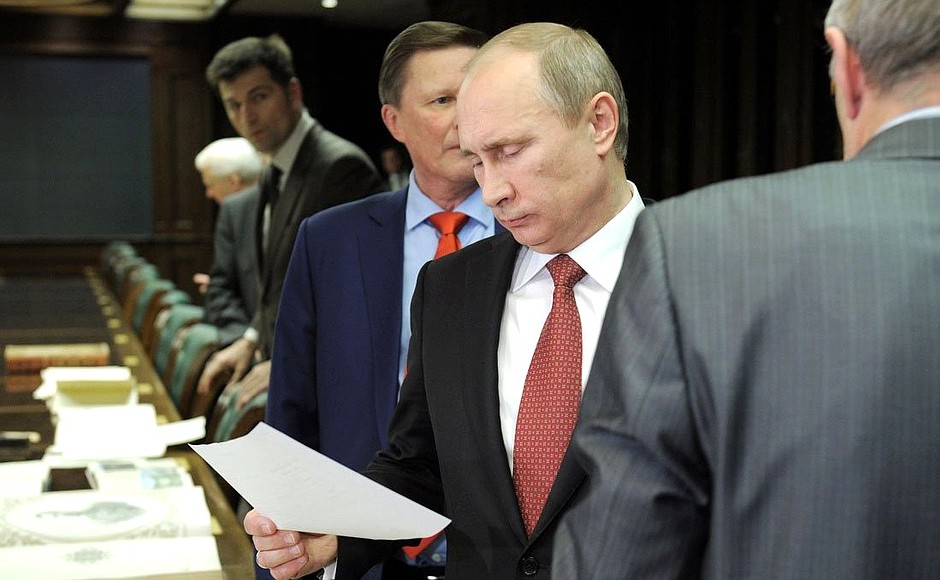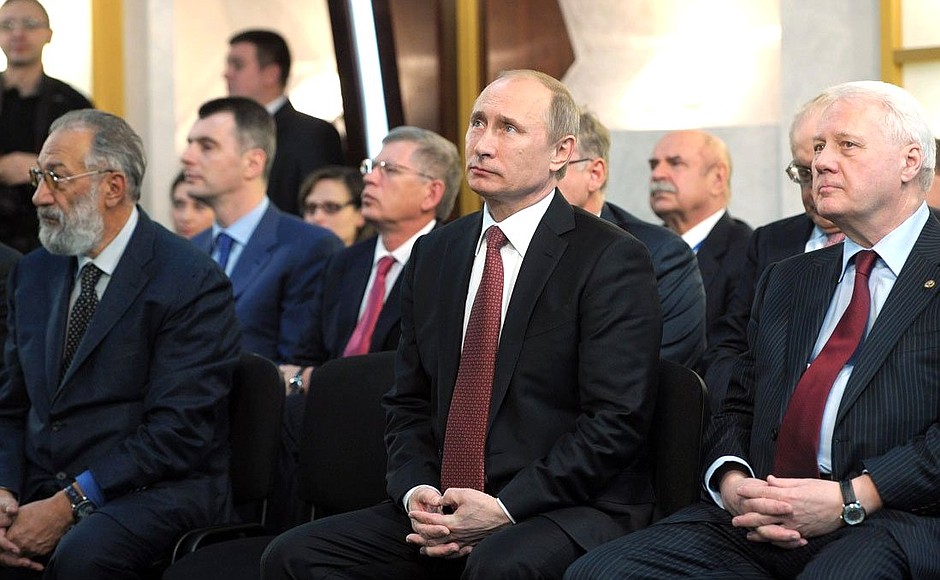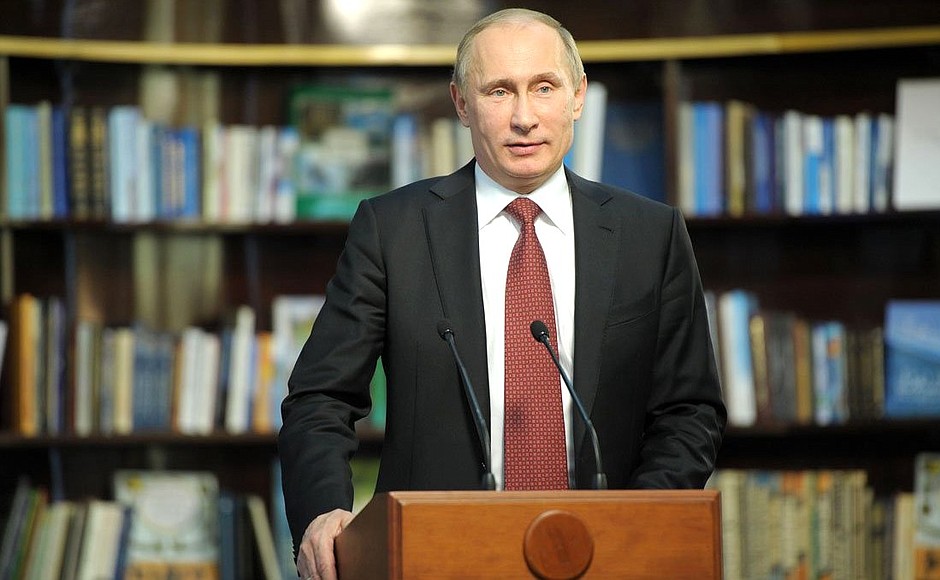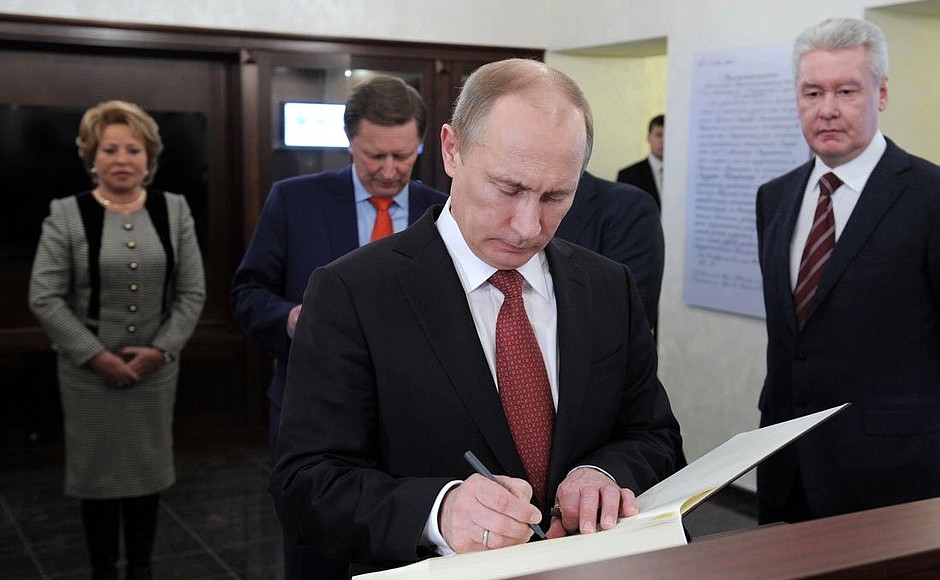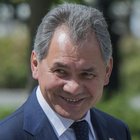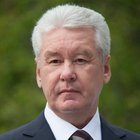The President toured the library and lecture-hall, and visited the multi-purpose media studio, which connects the headquarters via videoconference with all of the Society’s offices throughout the nation.
The ceremony was also attended by the Russian Geographical Society president and Defence Minister Sergei Shoigu, Moscow Mayor Sergei Sobyanin, and members of the Society’s Board of Trustees, which is chaired by Vladimir Putin.
The Russian Geographical Society was founded by the Russian Emperor Nicholas I in 1845. Since its creation, its goal has been to collect and disseminate geographical data on Russia. With historic headquarters in St Petersburg, the Society has offices operating in 81 Russian regions.
* * *
President of Russia Vladimir Putin: Friends, I congratulate you all on the opening of the Russian Geographical Society headquarters in Moscow. This is a pleasing and important event for everyone who loves our country, who is interested in its history and its culture, who cares about and values the traditions of our peoples.
I would like to particularly thank the Mayor of Moscow as it was Moscow city hall who provided this building, allocated funding for its renovation and organised the repairs. I also want to thank members of the Board of Trustees for helping to bring together everything that we have on these premises today.
I must also note that we have Russian Geographical Society offices open in 81 of the Russian Federation’s regions. But unfortunately, not all of these offices have their own buildings, even though that is very important and would not be difficult to achieve. Russian Geographical Society offices would certainly fill a very significant niche for those people who, as I said earlier, are truly and actively interested in the history, ethnography and traditions of our peoples.
These offices could serve as gathering places for scientists, public figures and, first and foremost, young people who want to devote part of their lives – or their entire lives – to their nation. Without the knowledge that is provided by the Russian Geographical Society, it would be actually impossible to do this properly and enjoyably.
The Russian Geographical Society has always had a tradition which was maintained even when the Society nearly ceased its existence, but its premises still remained in St Petersburg, the tradition of accumulating and effectively using various items. These are not just materials pertaining to scientific research, although that, too, is very important; they also include libraries, which have already been mentioned and which are starting to be replenished or created anew.
I am asking all the members of the Board of Trustees to aid in replenishing these pools, and some of our colleagues are already actively participating in their replenishment. I promise that for my part, I will do the same, and I hope that the stocks will be much in demand.
We certainly should apply a modern approach; we should transfer all the holdings to a digital format and establish effective partnerships with archiving institutions, regional museums and other regional centres in order to set up a modern, highly accessible method for allowing these materials to be used by everyone who would like to use them.
I sincerely congratulate all of us on this event; I wish the new home of the Russian Geographical Society success and very much count on both the people present today and everyone who loves our country to get involved in the Society’s work. Of course, this will largely depend on the media. In this respect, I would like to thank Mr Dobrodeyev [CEO of the National State Television and Radio Company (VGTRK)]. You have come up with a brilliant TV programme, and the team consists of very interesting people who are enthusiastic about their work. The TV programme really is designed for millions of our people and, in my view, has a very good approach to presenting interesting facts and information that are of significance for our society.
Once again, I congratulate all of you. Thank you very much.
